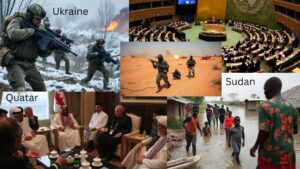In 2012, Treyarch released Call of Duty: Black Ops II, a game that would weave a complex narrative of modern warfare with a focus on technology and geopolitics. Set in the future, specifically in 2025, the game’s storyline caught the attention of gamers and pundits alike due to its unsettlingly accurate prediction of future events. One of the most notable aspects of its narrative involves a cyberattack leading to China’s decision to halt the export of rare earth minerals, an action that sparks a new era of conflict between the U.S. and China
.
The Real-World Significance of Rare Earth Minerals
Rare earth minerals are a group of 17 metallic elements crucial for manufacturing high-tech products, from smartphones and laptops to electric vehicles and military equipment. China is the world’s largest producer of these minerals, supplying about 90% of the global demand. This monopolistic control gives China significant geopolitical leverage.
The Plot of Black Ops II
In the game, a Chinese economic collapse is precipitated by a cyberattack in 2018. This event triggers China’s decision to ban the export of rare earth elements, effectively weaponizing its control over these critical resources. The U.S., heavily dependent on Chinese exports, finds itself in a precarious position. The resulting “Second Cold War” reflects how critical these resources are for national security and economic stability.
Predictive Themes in Real-World Context
The themes presented in Black Ops II sound eerily familiar today. China has indeed used its control over rare earths to apply pressure in international relations. Although the game exaggerates the likelihood of military conflict, its narrative highlights real-world concerns about resource dependency and geopolitical tensions.
China’s Strategic Use of Rare Earths
In recent years, China has used its dominance in rare earth production to send signals and apply economic pressure on other countries. For instance, China has threatened to cut off supplies to countries that oppose its policies, including decisions on export controls. This strategic leverage is a testament to the real-world relevance of the game’s storyline.
Key Takeaways
- China’s Control Over Rare Earths: The country maintains a significant monopoly on rare earth production, impacting global supply chains and geopolitical dynamics.
- Real-World Tensions Echo Game Themes: Current trade tensions and export controls reflect the game’s portrayal of resource conflict.
- Critical Role of Rare Earths: These minerals are indispensable for many modern technologies, making access to them a strategic concern.
FAQs
Q: Did Black Ops II Predict Actual Events?
- A:,While the game did not predict specific events, it highlighted the potential risks and geopolitical implications of China’s dominance in rare earths.
Q: Is China Using Rare Earths for Leverage?
- A: Yes, China has historically used its control over these minerals to influence economic and political decisions.
Q: Are Rare Earths as Important as Portrayed?
- A: Yes, they are essential for various technologies, including military applications, electric vehicles, and consumer electronics, making them a critical resource in modern industries.
Fiction Predicting Reality: The Strategic Importance of Rare Earths in Black Ops II
While Black Ops II’s vision of a new Cold War is fictional, its portrayal of geopolitical tensions over rare earths is remarkably prescient. As global dependence on these minerals continues to grow, the game serves as a cautionary tale about the potential risks of supply chain disruptions and the strategic importance of resource control.
The scenario in Black Ops II reminds us of the complex interplay between economic resources, geopolitics, and technology shaping our world. As we navigate the challenges of global trade and resource dependence, we see how fiction can sometimes mirror future realities.












